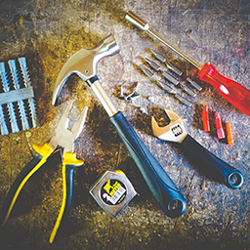It's very interesting from a design perspective and I like your general vision
Hi and thanks a lot for such detailed review!
First you want to make a game that is all about that customizable gameplay, but you are not designing the lore or the other features and mechanics to serve that gameplay. Instead you are trying to make that gameplay fit the model of a traditional rpg
Actually, I'm doing it for purpose – my goal is to make more-less "classic" RPG experience with new mechanics. There is no real reason for this, just I like RPG games and especially like classic-style RPGs, but almost all modern MMOs are going into different direction – very few customizations, limited player-vs-player interactions and so on.
But this abilities (while working on it, I've renamed original "skills" term to "abilities", while "skills" have a different meaning in my design – not strictly related to current mechanic), actually, not bound to any gameplay style. In terms of design, it could be used basically in any type of games, not only RPG.
However, as I said, my goal is to make more-less classical MMORPG, so that's why I'm talking not only about "mages", but also about other roles.
why do you have classes at all ?
I don't :) Player will be able to make/use any abilities (restricted by other game rules, of course, not to allow newbie players to create very powerful things).
When I'm talking about "warriors", "rogues", "archers" – it's not about classes, rather about different roles.
If you have played in Eve Online, you may know there are no classes or synthetic restrictions, any player could learn all available skills... But it will take about 18 years of real time, AFAIK. So, players should choose some way to progress to be somehow efficient in the game.
And in this terms, I don't like restriction to be only a mage for all players (even if there will be lot of ways to make each mage different). That's why I'm going to implement "classic" warrior/melee, archer/range and so on.
Rogues are a bit different from both "mages" and "physics", since in my opinion it's not about fights, rather about in-game lifestyle and sneaky gameplay; Actually, I didn't yet worked on this part, just keeping it in mind.
And, again, my goal is not to make pure sandbox in term of overall gameplay (sorry, if I have disappointed you).
About two different mechanics for abilities – you're right, at first I've tried to implement "classical" warrior role via the same "particles" system, but then realized here (thanks to Shaarigan) that "physical" abilities should work different way.
The best case would be to use full-body control, to make possible control every character's movement as in real life... but it's not yet invented :-)
So, I came up with such idea for a different abilities constructor, which will allow to "program" some movements and hits and then just use it with keyboard or/and mouse (or gamepad).
If you have an idea, how to implement "classic" physical abilities with the same "particles" system – I'll be happy to look for it.
The second thing you are doing wrong in my opinion is designing the spell crafting system from the "end" perspective
I see what you mean. And you're partially right – as I said, my goal is to implement "classic" RPG, so that's why I'm talking about "fireballs" and "portals".
You're right, I'm designing the system and using such things as a test-cases, to check if the system fits my goals or not.
But you're not right when talking that it allows to make "only slight variations" of classic abilities. In such case, I could choose a way which already used in some projects – e.g., where player has several "blocks" and could combine it in few ways and add few additional properties (from other blocks), as in LEGO.
Instead, my way will allows to create literally anything and those "fireballs" are just a basic example I've used to explain my system with comparison to pre-defined abilities.
and really you should call them "objects"
I'm not really sure what do you mean in this part. For now, "particles" (or "energies") are best term which exactly describes the things, while "object" is too broad for this, as I see.
Idea about attributes and sliders, as I see it from your text, not really fit my mechanic since it will be much more complex and a kind of programming-style for players, not casual at all. At least, will need to implement each of those attributes instead of making common rules for all (as in my case).
The third problem is complexity
This is the most complex problem, you're right. I'm thinking about how to implement such pretty complex system and at the same time not to ask player learn coding or learn complex UI things.
If talk about specific solutions, for now, I'm thinking about gestures-based constructor, where player could draw a form, move it and so on. Basically, similar to a simple graphic editor. But I don't really like this way, just can't design anything else which will be simple enough and still fit the system.
Well, about implementation – that's exactly what I'm stuck with, for now. Going to build several prototypes step-by-step as a proof-of-concept (I have some specific plans for it), but not yet sure how exactly implement it.
Sorry if I've missed anything from your post, just there are lot of different topics in it... :)
And thanks again for your thoughts, it's always good to discuss ideas.




